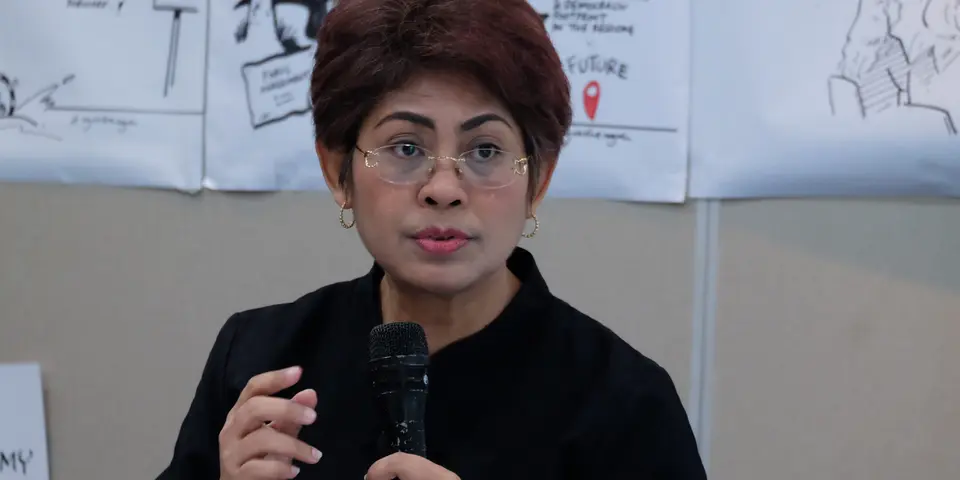
ASEAN should envision standardized democratic principles by 2045
September 24, 2024

Jakarta, 24 September 2024 – In recent years, the call for democratic consolidation within the Association of Southeast Asian Nations (ASEAN) has become increasingly vocal. As a region characterized by astounding diversity in culture, economy, and political systems, ASEAN stands at a critical juncture where adopting democratic norms can significantly shape its future trajectory toward peace, stability, and prosperity.
The juxtaposition of autocratic regression and democratic aspiration within the region underscores a profound collective yearning for freedom and accountable governance. Authoritarian regimes, bolstered by military influence, continue to suppress democratic freedoms, often quelling any form of dissent. Human rights violations persist, with freedom of speech and the press frequently curtailed, creating an atmosphere of fear and repression. Economic disparities further exacerbate this divide, hindering meaningful political participation across different strata of society.
Countries like Indonesia and the Philippines have made notable progress with regular elections and active civil societies. Indonesia, often regarded as a success story of democratization, has held multiple peaceful elections since the fall of Suharto’s regime in 1998. The nation showcases the potential of democracy to enhance participation and civic engagement.
In contrast, nations such as Myanmar, Thailand, and Cambodia demonstrate the fragility of democratic frameworks. Myanmar, in particular, faces a severe regression in democratic practice following the military coup in February 2021, which has resulted in widespread violence, human rights abuses, and the imprisonment of democracy advocates. Thailand has oscillated between military rule and democratic governance, marked by a controversial legislative framework that many believe undermines authentic democratic practices.
As ASEAN envisions its future towards 2045, the inclusion of democratic norms in its long-term strategic plans is non-negotiable. This entails not just the adoption of electoral standards but also a broader commitment to upholding the principles of democracy, human rights, and the rule of law across the region. Such an initiative requires a visionary approach that transcends immediate political interests and focuses on the enduring benefits of democratic governance for regional integration, peace, and development.
ASEAN’s endeavor to standardize elections is not just about logistical and administrative improvements but is fundamentally about reinforcing the very essence of democracy. But, given the diversity of political systems within ASEAN, from full-fledged democracies to authoritarian regimes, crafting a one-size-fits-all approach is impractical.
Establishing regional electoral standards in ASEAN is not an alien concept. African and European experiences provide a blueprint for successful implementation. The European Commission for Democracy through Law, better known as the Venice Commission, and the African Charter on Democracy, Elections, and Governance represent a global benchmark for promoting democracy.
Established in 1990, the Venice Commission offers legal advice to member states to bolster democratic systems and uphold human rights standards. Its expert interventions, recommendations, and analyses serve not only to guide but also to correct and inspire democratic reform across borders.
One of the most notable aspects of the Venice Commission’s work is its role in assessing the constitutionality of laws and their impact on democratic standards. The Commission has influenced significant legislative reforms through its comprehensive reviews, ensuring they align with European and international norms of democracy and human rights. This experience offers ASEAN a blueprint for navigating the complexities of fostering democracy within its diverse member states.
Meanwhile, the African Union adopted the African Charter in 2007. It sets out rules for fair elections and good governance, emphasizing the importance of democracy, human rights, the rule of law, and transparent government. It calls for strong institutions and sanctions for non-compliance. Implementation is not without a challenge, with issues like electoral fraud and human rights violations persisting in some member states. But, if fully embraced, the Charter can help Africa achieve stable democracy and prosperity.
Adopting best practices from regions like Europe and Africa, ASEAN can pioneer a more democratic pathway by supporting political parties that operate transparently, champion the public’s voice, and ensure robust mechanisms for accountability. Such precedents are invaluable for ASEAN as it contemplates the establishment of regional standards for elections. These standards are crucial for promoting transparency and fairness, addressing pressing concerns such as fake news, hate speech, and the fraudulent use of executive power.
A tailored approach is needed to consider the unique political, cultural, and historical contexts of ASEAN member states while remaining steadfast in the pursuit of democratic principles. By drawing from global best practices and adapting them to its unique context, ASEAN has the opportunity to emerge as a beacon of democracy in the global South, ensuring that it remains relevant, resilient, and responsive to its people’s aspirations.
The path forward requires collective action, steadfast commitment, and unwavering belief in the principles of democracy. In the end, it is through such values that ASEAN will achieve a future marked by prosperity, peace, and the collective well-being of its citizens.
Mercy Chriesty Barends, APHR Chairperson and Indonesian MP.
•This Op-Ed first appeared in The Jakarta Post on 24 September 2024.
ASEAN Parliamentarians for Human Rights (APHR) was founded in June 2013 with the objective of promoting democracy and human rights across Southeast Asia. Our founding members include many of the region's most progressive Members of Parliament (MPs), with a proven track record of human rights advocacy work.